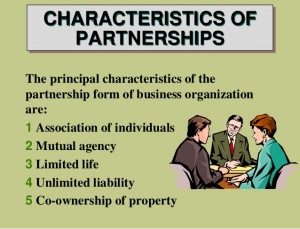What is Partnership Business
Partnership business is a single business where two or more people share ownership. Each partner contributes to all aspects of the business, including money, property, labor or skill. In return, each partner shares in the profits and losses of the business.

Partnership Business Meaning:
Sole trading concern has limited capital, limited managerial skill, and cannot carry on business on a large scale. So persons generally combine to have enough resources and skill for doing business on a big scale. When two or more persons agree to carry on business for their mutual advantage such business is termed as ‘ Partnership’. A partnership firm consists of two or more persons who have joined capital and or service to carry on a lawful business with a view to gain profit.
You May Also Like to Read
According to Dr.J.A.Shubin :” Two or more individuals may form a partnership by making a written or oral agreement that they will jointly assume full responsibility for the conduct of a business”.
In other words of Prof. Haney : “Partnership is the relation between persons competent to make contract who agree to carry on a lawful business in common with a view of private gain”.
Partnership Act 1932 Definition of “Partnership” is the relation between persons who have agreed to share the profits of a business carried on by all or any of them acting for all.
In conclusion, we can define partnership firm as an associate of persons who have come together with a view to to-do business in shared with a view to make profit. This relation of partnership exists out of contract. Persons who have entered into this relationship or partnership are individually known as ‘partners’ and jointly as ‘firm’. The business is agreed on a particular name called the ‘firm’s name’.
The above definitions clearly bring out the following essential elements, which constitute a partnership firm as a form of business organization:
1. There must be at least two or more persons to form partnership.
2. They carry business with one specific name.
3. There must be agreement between persons desirous of forming partnership.
4. Profit or loss is shared according to the agreement.
5. The business must be managed by all or one or more of them acting for all.
6. The partnership firm should be registered in the books of Nepal Government.
Characteristics of Partnership Business
The discussion of various definitions of partnership leads to the following characteristics of partnership business:

Association of Two or More Persons: Partnership is the result of a contract, so there must be two or more persons to enter into a contract. An association of two or more persons to enter into a contract. An association of two or more persons will become a partnership only when it is meant to do some business. If the purpose is social service, it will not be a partnership. In partnership act, the maximum number of partners is not mentioned.
Agreement: The partnership is set up by an agreement between partners. In the absence of agreement partnership cannot be established. There must be a written agreement which helps to settle the disputes if they occur later.
Principal Agent Relationship: The business must be agreed by all or one or more acting on behalf of all partners. So every partner is an agent of the firm as well as of the other members. Whether participating in management or not, every partners will be liable for action of each of the other partners in the ordinary course of business. Thus, every partner has a double role as an agent and principal, at the same time.
Sharing Profit and Loss: The purpose of partnership should be to earn profits and there must be an agreement to share profit and loss. Profit and loss sharing ratio depends on the mutual contract among partners. But if a work is done for charity purposes, it cannot be called partnership.
Unlimited Liability: In partnership, partners have joint and several unlimited liabilities. So in the first instance, they have to share the loss jointly in profit sharing ratio. But if any or more partners are unable to contribute to their shares of deficiency, the remaining partners have to pay for their shares also.
No Free Transfer of Share: A partner is not permitted to sell or transfer his share to an outsider without the consent of all partners. Partnership share is not a freely transferable asset.
No Legal Status: The partners and the firm are not legally separate. Partnership is purely personal organization it has no separate legal personality.
Registration: The registration of partnership is compulsory unless the firm is registered, it cannot be partnership.
Stability: A partnership is established on the basis of the mutual contract among partners. So, the stability of a partnership is dependent on its contract. If a partner retires or dies, the contract is terminated.
